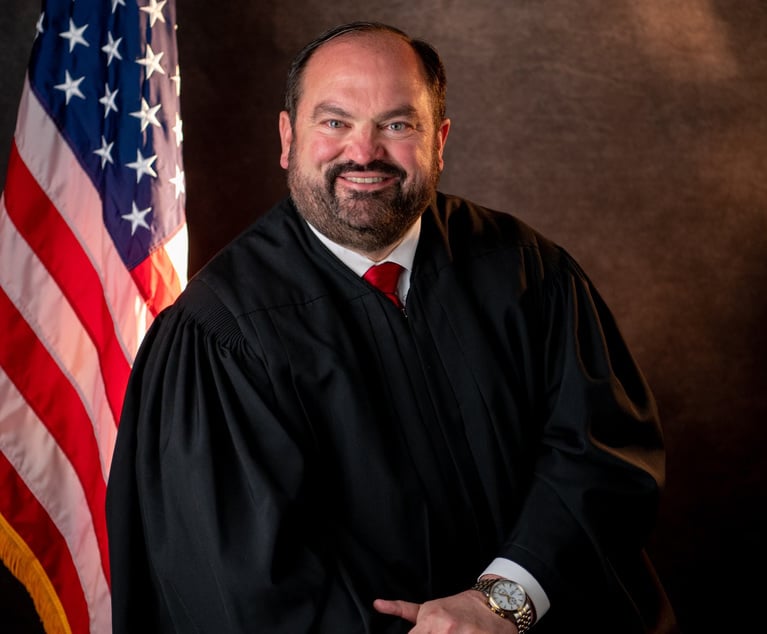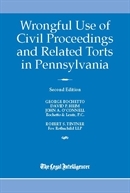Candidate: Judge Harry F. Smail Jr.
Court: Superior Court
Party: Republican
Pennsylvania Bar Association rating: Recommended
The following has been edited lightly for length and style.
The Legal Intelligencer: How would you describe your judicial philosophy?
Judge Harry F. Smail Jr.: My judicial philosophy is rooted in the language of the law and the Constitution. As a judge, I must take the law, as written by the legislature and signed by the governor, and apply it. I can’t fix a law that may need it. I have to apply it as written.
The Legal: What makes you the best candidate for the role?
Smail: Pennsylvania voters should vote for me because I have a comprehensive record as a litigation attorney in all practice and subject areas that come before the Superior Court and a trial judge in all areas. My opinions have a 97% affirmation rate, with only 3% remanded to me for procedural adjustments. My decorum and procedural adherence to the law of Pennsylvania are unwavering. I do not legislate from the bench; rather, I apply and enforce the law as intended as the third branch of government providing the checks and balances that make our government functional. My record is transparent, verifiable and honorable in being the most qualified to be seated on the Superior Court
The Legal: What is the greatest threat to the practice of law or problem the profession faces?
Smail: I think one of the biggest issues we face is unscrupulous members of the legal profession who use the profession for personal enrichment rather than the pursuit of justice. The members of our profession who have made a fortune peddling frivolous lawsuits not only clog our courts with cases delaying the cases of other cases but give the profession a bad name.
The Legal: What does your party membership say about you and your legal outlook?
Smail: I don’t ascribe much to what my party membership says about my legal outlook. Throughout history, there have been what some would call activist judges and judges who apply the text of the law as written by both parties. It is more critical to look at the written record of a judge rather than their partisan affiliation to determine their legal outlook.
The Legal: Do you think courts in Pennsylvania have a perception problem when it comes to appearing partisan or polarized? If so, what would you do to combat this?
Smail: I do. I think too many judges try to fix laws instead of remanding them to the appropriate body for corrective action. We have three branches of government for a reason. When the court is perceived to become a de-facto rubber stamp for one branch over another or worse, tries to usurp the prerogative of another branch, I think the perception becomes that we are a policy-making body instead of an umpire determining the constitutional and statutory legitimacy of the laws.
The Legal: Several CLEs and bench-bar panels have recently addressed the growing phenomenon of distrust in the courts. In your view, how has distrust in the judiciary created challenges for the bench, and how should judges respond?
Smail: The judiciary doesn’t have a police force and doesn’t have a PR wing to sell the legitimacy of our decisions. We only have the aura of the court’s authority. Judges who wish to re-establish the courts must use our authority with humility and be grounded in the text of the law and Constitution. It is the source from which we draw our authority. The closer we stay to it the more credible we are.
The Legal: What factors matter in deciding when recusal is necessary, and would you recuse yourself if a campaign contributor were involved in litigation as a party or attorney before you?
Smail: I can understand how observers of the court could be concerned by the dynamic of a campaign contributor. A judge must rule on the facts before them not based on the lawyers in front of them. As a judge in the Court of Common Pleas, where I served as an attorney, I’ve had countless instances where a friend or former opposing counsel has come before my court. Any time a judge has a previous connection to the parties involved doesn’t warrant a recusal. That holds true for personal connections and campaign connections described in the question. If it can be demonstrated that neutrality has been violated disciplinary action must be taken.
The Legal: How important is consensus—particularly unanimous consensus—in appellate court opinions? Are there limits when a judge should only concur?
Smail: I think the legal soundness of a decision is more important than the unanimity of it. The reason we have panels of judges to decide appellate cases is to ensure multiple perspectives are viewing the case and providing feedback as a judge of judges. The are no limits when a judge should only concur.
The Legal: What two decisions or cases are you most proud of, and why? Conversely, what two opinions or cases would you like to take back or revise if you could, and why?
Smail: I would point to a decision concerning the constitutional issues involved in a case against Springfield Armory, which was a case that hinged on the constitutional questions around the Federal Arms Dealer law. This case was a very complicated case that delved into a very important area of constitutional law. The opinion was written with the knowledge of its likely appeal.
A second case I would point to is an open records case in Monessen. This case involved a highly contentious controversy between members of the city government. This case required judicial intervention to return the city to a functioning government.
As far as regrets, there are several cases from my time in family court that I look back on and wish I had a chance to hear again. Some of these cases can be coin flips based on the facts before you. You then hear of someone having further dealings with the judiciary and wonder if a different decision may have altered that person’s life. When it’s the black and white text of the law it’s easier to be sure of your reading of a law. When it’s a judgment call like we are handed in Family Court, it is more of a gray area that you can second guess yourself on.
The Legal: Who are your role models and mentors?
Smail: As a student, I studied closely the writings of Justice Antonin Scalia. His way of writing brought such clarity to the law as a young man. I particularly was enthralled by his writings when you knew that on a personal level he disagreed with the net effect of his ruling but ruled that way because it is what the law demanded.
As far as a mentor, I would point to my father. A veteran of the Korean War, he supported our family on a middle-class salary and provided me the opportunity to attend college.
NOT FOR REPRINT
© 2024 ALM Global, LLC, All Rights Reserved. Request academic re-use from www.copyright.com. All other uses, submit a request to [email protected]. For more information visit Asset & Logo Licensing.


 Judge Harry F. Smail Jr., a candidate for the Superior Court. Courtesy photo
Judge Harry F. Smail Jr., a candidate for the Superior Court. Courtesy photo






